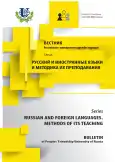编号 2 (2011)
- 年: 2011
- 文章: 21
- URL: https://journal-vniispk.ru/2618-8163/issue/view/23445
Articles
Specifying function of index and metonymic sign-image
摘要
The article presents one of the functions of index and metonymic sign-image in an artistic text.
Russian Language Studies. 2011;(2):5-8
 5-8
5-8


Syntactic core zone of sentences meaning «state of the nature» in the russian language
摘要
In this article the author makes an attempt to analyse the contents of syntactic units (structural schemes of simple sentences) of the typical proposition «state of the nature» and reveal paradigmatic relations between these units in syntactic core zone..
Russian Language Studies. 2011;(2):9-16
 9-16
9-16


Ethnic and cultural context of studying russian lexicon in french-speaking audience
摘要
The article considers questions of teaching lexicon as an object to be described and studied in teaching Russian as a foreign language. The role and place of an ethnic and cultural component are defined in intercultural communication. In addition, lexical differences between Russian and French languages caused by different national cultures are analyzed.
Russian Language Studies. 2011;(2):17-24
 17-24
17-24


Semantic types of compound words
摘要
The article deals with an actual problem of linguistic typology - a problem of compound word classification based on semantic principle. The existing descriptive grammar classifications of the compound words, prerequisites of creating and theoretical basis of their general semantic classification are also discussed in the article.
Russian Language Studies. 2011;(2):25-30
 25-30
25-30


Specific of the phenomenon «figurative word»
摘要
The article determines peculiarities of a figurative word and systematic indications of a language image. In our speech a figurative word transmits semantic double-sided nature, expressiveness, reinforced meaning, emotiveness, estimativeness. The main peculiarities of a figurative word are its polysemantic, semantic complexity, a wide range of associations, symbolism, metaphoric meaning.
Russian Language Studies. 2011;(2):31-38
 31-38
31-38


Food metaphor in russian
摘要
The article provides a brief overview of the concept of metaphor in modern linguistics and reveales some mechanisms of its formation. and cognitive and pragmatic functions. An analysis of metaphorical models on the example of food metaphors in the Russian language is presented.
Russian Language Studies. 2011;(2):39-44
 39-44
39-44


The symbolics of loneliness on the material of modern literature
摘要
In the article the analysis of the symbolics of loneliness on the material of the modern literature of last decade is given, the lexical structure of language of the lonely hero is considered.
Russian Language Studies. 2011;(2):45-51
 45-51
45-51


A speech portrait of our contemporary in A.S. Kushner's lyrics
摘要
The article is devoted to the speech image of the author in A.S. Kushner's poetry. Combining various socially marked colloquial units with traditional poetic means forms individual style of the author and creates a vivid image of our time.
Russian Language Studies. 2011;(2):52-57
 52-57
52-57


Activating attention mechanisms in teaching russian as a foreign language
摘要
In article problems of development of attention in educational process are reflected. Types, properties, kinds of attention and their role in teaching material mastering are considered. The basic functions of attention are marked.
Russian Language Studies. 2011;(2):58-61
 58-61
58-61


The intertextual characteristics of epigraphs in the original text and its translation
摘要
The article is devoted to intertextual characteristics of epigraphs in the original text and its translation. It touches upon the role and functions of the epigraph as an inserted text and contains an analysis of the epigraph's intertexuality types. The article also describes the nature of correlation between epigraphs' intertexual characteristics in the original text and its translated variant.
Russian Language Studies. 2011;(2):62-69
 62-69
62-69


Functioning of the frame human life in english postmodern discourse
摘要
This article is devoted to the analysis of functioning of the frame HUMAN LIFE in English postmodern literary discourse.
Russian Language Studies. 2011;(2):70-75
 70-75
70-75


Functions of euphemisms in newspapers headlines
摘要
The author examines some particularities of newspaper headlines and analyses the main characteristics of euphemisms there: softening rude meaning, masking true sense, observance of the etiquette etc.
Russian Language Studies. 2011;(2):76-80
 76-80
76-80


Literary text in a foreign audience: application of the theory of communicative grammar in the textbook based on works by A. Chekhov and F. Dostoevsky
摘要
On the example of the textbook created by the authors the possibility of using the ideas of communicative grammar (a school of modern Russian philology) in the practice of teaching Russian as a foreign language is demonstrated.
Russian Language Studies. 2011;(2):81-87
 81-87
81-87


The role-playing method for boosting students' activity
摘要
The article deals with the aspects of the modern classifications and use of the role-playing method for boosting students' activity and provides the implementation of communication intentions as part of the modern communication skills.
Russian Language Studies. 2011;(2):88-95
 88-95
88-95


Toponymy of the canadian province of Prince Edward island as part of the toponymic world view of the canadians
摘要
The article reviews toponymy of the Canadian province of Prince Edward Island. Analysis of this part of Canadian toponymy helps specify the role of geographical names in the formation of linguistic world view of the Canadians and obtain linguistic and cultural data about language and culture contacts on the territory of Canada.
Russian Language Studies. 2011;(2):96-103
 96-103
96-103


Russian heritage in east and central european countries (A review of the materials of Interstate Scientific Conference Russian Heritage in East and Central European Countries in honour of 600th anniversary of Greenvale Battle)
Russian Language Studies. 2011;(2):104-107
 104-107
104-107


E.I. Passov, N.E. Kuzovleva. Bases of Communicative Theory and Foreign Language Teaching Techniques
Russian Language Studies. 2011;(2):108-109
 108-109
108-109


Russian Language and Speech Culture: electronic manual for medical students
Russian Language Studies. 2011;(2):110-111
 110-111
110-111


I.A. Gerasimenko. Semantics of Russian Colour Words
Russian Language Studies. 2011;(2):112-112
 112-112
112-112


Our Autors
Russian Language Studies. 2011;(2):113-115
 113-115
113-115


PRAVILA OFORMLENIYa I PODGOTOVKI STATEYK SDAChE V «VESTNIK RUDN. Seriya „Russkiyi inostrannye yazyki i metodikaikh prepodavaniya»
Russian Language Studies. 2011;(2):116-117
 116-117
116-117











